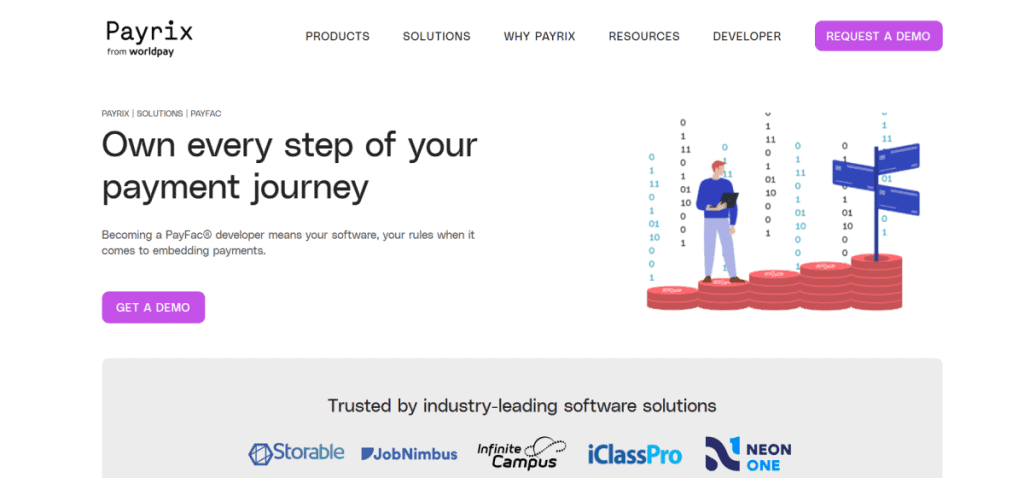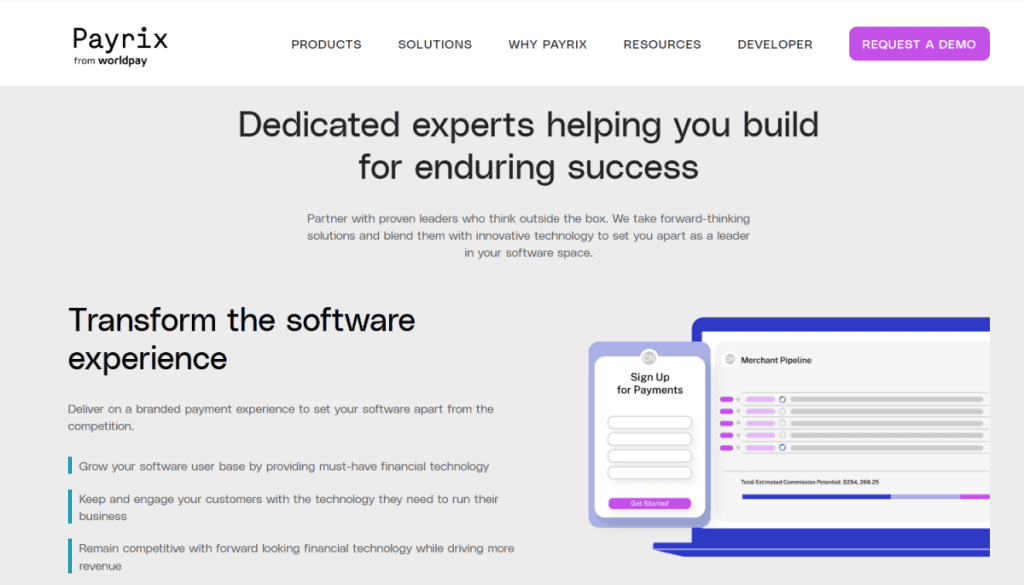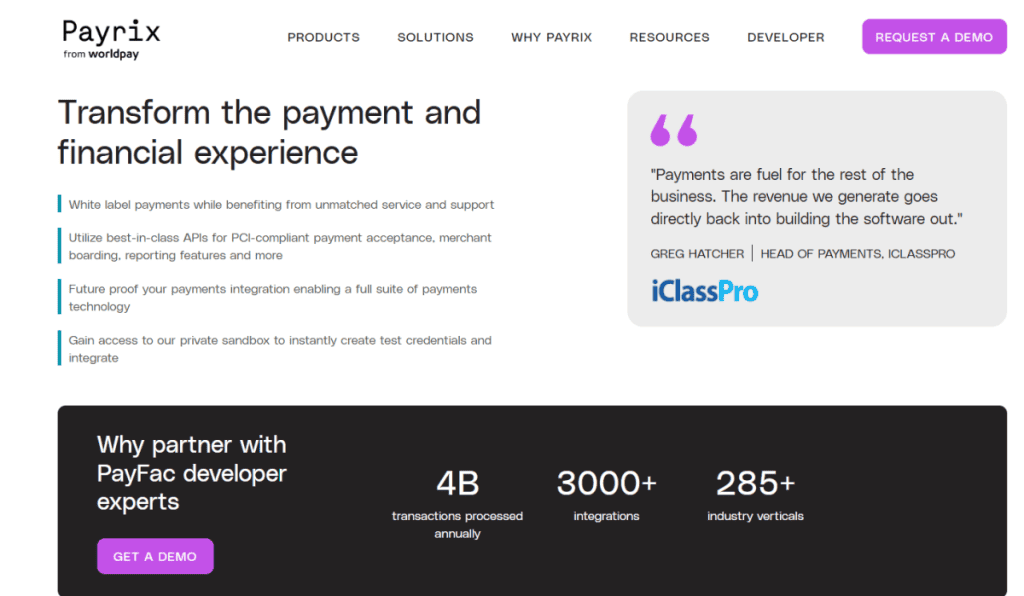
Payrix Payfac Review
- 20th Feb, 2025
- | By Linda Mae
- | Reviews
Digital payments are evolving and companies are progressively seeking seamless, scalable, and efficient solutions for payment processing. Payrix, a division of FIS (Fidelity National Information Services), is a significant participant in the payment facilitation sector, providing embedded payment solutions designed for software platforms and independent software vendors. By allowing companies to embed payment processing directly into their systems, Payrix offers a complete range of services that simplify merchant onboarding, compliance oversight, and transaction handling. Lets read more about Payrix Payfac Review.
Payrix distinguishes itself through its flexible PayFac-as-a-Service model and a full PayFac® solution, allowing software companies to choose between a simplified, managed approach or a fully integrated, self-managed payment facilitation experience. The platform supports various payment methods, including credit and debit cards, ACH transactions, and digital wallets, making it a versatile solution for businesses operating across multiple industries.
As a contemporary PayFac provider, Payrix focuses on automation, risk management, and scalability. It primarily serves SaaS platforms and tech-oriented businesses aiming to monetize payments while preserving oversight of the user experience. Featuring a developer-friendly API and white-label options, Payrix allows businesses to integrate payments seamlessly, avoiding the complications tied to conventional merchant accounts.
In this review, we will explore Payrix’s offerings in detail, evaluating its features, pricing, compliance measures, and overall value proposition. By examining both its strengths and potential limitations, this unbiased analysis will help businesses determine whether Payrix is the right payment facilitation solution for their needs.
Company Background | Payrix Payfac Review
Payrix was established with the goal of making payment facilitation easier for businesses and software platforms aiming to integrate payments smoothly into their services. Acknowledging the increasing demand for integrated financial solutions, Payrix created an all-encompassing payment system that allows software providers to act as payment facilitators without the challenges of handling compliance, underwriting, and risk independently.
In 2021, Payrix was acquired by FIS, a global leader in financial technology solutions. This acquisition further strengthened Payrix’s capabilities by providing access to FIS’s extensive network, resources, and expertise in payment processing and financial services. As a result, Payrix has been able to scale its offerings, enhance security features, and expand its global reach.
Mission and Vision
Payrix aims to enable software platforms with effortless and scalable payment solutions, enabling businesses to incorporate payments as a fundamental aspect of their services. The organization imagines a future in which embedded payments are seamless, safe, and highly adaptable, allowing software vendors to improve user experiences while creating new revenue streams.
Key Milestones and Achievements
Founding and Early Growth: Developed as a specialized payment facilitator designed for SaaS platforms.
Acquisition by FIS (2021): Marked a significant expansion in resources and capabilities.
Expansion of PayFac Models: Launched both PayFac-as-a-Service and full PayFac® solutions to cater to different business needs.
Strengthened Compliance & Security: Enhanced fraud prevention and risk management tools.
Global Expansion: Extended payment services to new markets, broadening accessibility for international software providers.
With these milestones, Payrix has positioned itself as a strong contender in the embedded payments industry, offering businesses a robust and flexible PayFac solution.
Payrix PayFac Solutions
Payrix offers two primary solutions for businesses looking to integrate payment facilitation: PayFac-as-a-Service and the full PayFac® model. Both are designed to provide software platforms and ISVs with the ability to process payments seamlessly, but they differ in terms of control, complexity, and responsibility.
PayFac-as-a-Service
PayFac-as-a-Service is a comprehensive, managed payment facilitation option that enables companies to integrate payments into their platforms without assuming the entire regulatory and compliance responsibility. Using this model, Payrix manages underwriting, compliance, risk assessment, and merchant onboarding, allowing software firms to profit from payments without significant operational burdens. It serves as a perfect option for platforms aiming to offer integrated payments swiftly without dealing with the challenges of registering as a PayFac.
Full PayFac® Model
The full PayFac® model is designed for businesses that want to take full ownership and control of their payment processing. This solution provides companies with the infrastructure to become a registered payment facilitator, giving them direct control over onboarding, merchant relationships, risk management, and pricing structures. However, this approach requires significant investment in compliance, fraud prevention, and operational resources.
Comparison of Both Models
Ease of Implementation: PayFac-as-a-Service is faster and simpler, while full PayFac® requires a more involved setup.
Control & Customization: Full PayFac® offers complete control, whereas PayFac-as-a-Service outsources key processes to Payrix.
Risk & Compliance: Full PayFac® demands in-depth regulatory compliance, while PayFac-as-a-Service minimizes liability.
Target Audience
PayFac-as-a-Service: Ideal for SaaS platforms, startups, and businesses that want embedded payments without regulatory burdens.
Full PayFac® Model: Best suited for larger, established businesses looking to own the entire payment experience and maximize revenue.
By offering these two solutions, Payrix provides flexibility to businesses at different stages of growth, allowing them to choose the level of control and responsibility that aligns with their strategy.
Features and Functionality
Payrix provides an extensive array of features aimed at streamlining payment processing for software platforms. With adaptable payment acceptance and strong risk management features, its capabilities are customized to fulfill the requirements of companies looking for integrated payment solutions.
Payment Acceptance
Payrix supports a variety of payment methods, including credit and debit cards, ACH transfers, and digital wallets like Apple Pay and Google Pay. Its omnichannel capabilities enable businesses to process transactions across multiple touchpoints, whether online, in-person, or through mobile applications. Additionally, Payrix provides developer-friendly APIs that allow for seamless integration into existing software platforms, ensuring a smooth payment experience for end users.
Merchant Onboarding
A notable feature of Payrix is its automated underwriting and risk evaluation, which speeds up merchant approval while ensuring compliance. Companies can develop personalized onboarding processes designed to meet their specific operational requirements. The duration for activating a merchant differs according to risk evaluation, yet Payrix strives for fast, seamless onboarding.
Risk and Compliance Management
Security and compliance are critical in payment processing, and Payrix offers fraud detection and prevention tools to minimize transaction risks. The platform is PCI-compliant, ensuring adherence to industry security standards. Tokenization and encryption further protect sensitive payment data from breaches.
Reporting and Analytics
Payrix provides real-time transaction monitoring, allowing businesses to track payments and detect anomalies instantly. Its customizable reporting dashboards offer in-depth insights into payment trends and customer behavior, helping businesses optimize their financial strategies.
White-Labeling and Customization
Payrix provides white-label payment solutions, allowing businesses to preserve their brand image while delivering integrated payment services. Users have the ability to tailor the interface and user experience to match their brand. Furthermore, the platform provides adaptable fee structures and pricing models, allowing businesses to manage their revenue sources.
With its robust feature set, Payrix provides businesses with the tools needed to manage payments efficiently while maintaining security, compliance, and brand consistency.
Implementation Process
Incorporating Payrix into a current system requires a methodical approach aimed at facilitating seamless implementation and reducing interruptions to business activities. Regardless of employing PayFac-as-a-Service or the complete PayFac® model, companies must adhere to a series of essential steps to effectively execute Payrix’s payment solutions.
Steps Involved in Integration
Initial Assessment & Account Setup – Businesses must first determine which Payrix model suits their needs. After registration, Payrix provides credentials for access to its API and platform.
API Integration & Customization – Payrix offers developer-friendly APIs that allow seamless integration with existing software. Businesses can customize payment flows, UI components, and merchant onboarding workflows.
Merchant Onboarding & Testing – The next phase includes setting up merchant accounts, configuring risk settings, and conducting sandbox testing to ensure transactions are processed correctly.
Compliance & Security Setup – Businesses must ensure PCI compliance, enable fraud prevention mechanisms, and implement tokenization to safeguard payment data.
Go-Live & Optimization – Once testing is complete, the system goes live. Continuous monitoring and optimization are necessary to improve transaction performance and user experience.
Typical Timelines and Phases of Deployment
Basic Integration (1-2 weeks): Suitable for businesses using PayFac-as-a-Service with minimal customization.
Moderate Customization (4-6 weeks): Requires API integrations, UI adjustments, and branding.
Full PayFac® Deployment (3-6 months): Businesses opting for full payment facilitation need extensive compliance, underwriting, and risk management setup.
Resources and Support During Implementation
Payrix provides extensive developer documentation, API references, and SDKs to facilitate integration. Businesses can access dedicated support teams, training materials, and compliance guidance to ensure a successful launch. For complex implementations, Payrix offers technical consultations and troubleshooting support, ensuring businesses have the necessary assistance throughout the deployment process.
Pricing and Revenue Models
Payrix provides a customizable pricing model designed to meet various business requirements, regardless of whether a company chooses PayFac-as-a-Service or the complete PayFac® solution. Costs fluctuate depending on elements like transaction volume, risk degree, and necessary features. Nonetheless, Payrix does not openly provide a set pricing structure, which means companies must reach out to their sales team for a tailored estimate.
Overview of Pricing Structures
PayFac-as-a-Service: Businesses using this model typically pay a per-transaction fee, which may include interchange fees, processing costs, and a markup. Since Payrix handles compliance, underwriting, and merchant onboarding, there may also be monthly platform fees or additional costs for advanced risk management tools.
Full PayFac® Model: Companies opting for full payment facilitation bear the costs of regulatory compliance, underwriting, and fraud prevention. They may pay licensing fees, compliance costs, and operational expenses, but they gain full control over pricing and revenue distribution.
Revenue-Sharing Opportunities for Partners
Payrix allows software platforms, ISVs, and SaaS providers to earn income via payment processing markups. Companies have the ability to establish their own pricing structures, either by implementing a fixed charge for each transaction or opting for a commission based on a percentage. Payrix’s white-label offering enables businesses to market and provide payment services under their own brand while profiting from every transaction.
Cost-Benefit Analysis for Potential Clients
Pros: Low upfront costs for PayFac-as-a-Service, seamless merchant onboarding, and minimal compliance burden.
Cons: Full PayFac® requires significant investment in compliance and risk management.
Who Benefits? Startups and SaaS companies benefit from PayFac-as-a-Service, while established enterprises with high transaction volumes may find Full PayFac® more profitable in the long run.
Customer Support and Resources
Effective customer support is a crucial factor when evaluating a payment facilitation provider, and Payrix offers multiple support channels to assist businesses during onboarding, integration, and ongoing operations. While the company provides essential support resources, the overall responsiveness and availability may vary based on the service model and the level of customization required by businesses.
Availability and Responsiveness of Customer Support
Payrix offers regular support via email, telephone, and an online ticketing platform. For firms utilizing PayFac-as-a-Service, customer support is more proactive, as Payrix oversees merchant onboarding, compliance, and risk management. Nonetheless, for companies choosing the complete PayFac® model, a higher degree of self-administration is necessary, indicating they might have to depend more on documentation and developer tools instead of direct assistance.
Some users report delays in response times, especially for complex issues, while others find the service satisfactory for routine inquiries. Higher-tier clients may have access to dedicated account managers, which can improve response times and service quality.
Training Programs and Educational Materials
To support its users, Payrix provides training materials, webinars, and guides to help businesses understand payment facilitation, compliance, and risk management. These resources are particularly useful for software platforms that want to educate their teams on payment infrastructure.
Access to Developer Resources and Documentation
Payrix offers comprehensive API documentation, SDKs, and sandbox environments for developers to test integrations before going live. The documentation is well-structured, making it easier for software teams to implement Payrix’s solutions.
Pros and Cons
As a payment processing provider, Payrix delivers various functionalities aimed at assisting software platforms in seamlessly integrating payments. Nonetheless, like any option, it presents both benefits and disadvantages that companies ought to weigh before selecting the platform.
Advantages
Comprehensive Suite of Features – Payrix provides an extensive set of tools, including payment acceptance, risk management, reporting, and white-labeling options. These features make it a strong choice for businesses looking for an all-in-one payment facilitation solution.
Flexibility in Service Models – With both PayFac-as-a-Service and the full PayFac® model, businesses can choose a solution that aligns with their needs. Startups and SaaS platforms can benefit from the managed approach, while larger enterprises can take full control with the full PayFac® model.
Strong Security and Compliance Measures – Payrix ensures PCI compliance, fraud prevention, tokenization, and data encryption, making it a secure choice for handling sensitive payment information. Automated risk assessment further helps businesses mitigate fraudulent transactions.
Disadvantages
Potential Challenges for Smaller Businesses – While Payrix offers a managed PayFac solution, smaller businesses with low transaction volumes may find the service too complex or costly compared to standard merchant accounts or traditional payment processors.
Complexity in Full PayFac® Implementation – Businesses that opt for the full PayFac® model must navigate regulatory requirements, merchant underwriting, and risk management, which can be overwhelming for those without experience in the payments industry.
Pricing Considerations for Startups – Payrix does not publicly disclose pricing, and the cost structure may not be ideal for startups with tight budgets. Additional fees for compliance, fraud prevention, and customization may increase overall expenses.
Competitor Comparison
Payrix functions within a competitive environment together with prominent payment facilitation companies such as Stripe, Stax Connect, Adyen, and WePay. All of these platforms provide integrated payment solutions designed for software platforms and SaaS providers. Although Payrix offers a strong range of features, it possesses both benefits and aspects where rivals might excel.
Comparison with Other Payment Facilitation Providers
Stripe Connect: Known for its developer-friendly APIs and global reach, Stripe Connect is often a preferred choice for businesses looking for a highly scalable, customizable solution. It offers fast onboarding, extensive documentation, and seamless international payment support, making it ideal for global SaaS platforms.
Stax Connect: Unlike Payrix, which offers PayFac-as-a-Service and full PayFac®, Stax Connect follows a subscription-based pricing model, which can be cost-effective for businesses with high transaction volumes.
Adyen: Adyen provides an end-to-end acquiring solution, eliminating the need for third-party processors. Its strength lies in global compliance and omnichannel capabilities, making it a strong competitor to Payrix for enterprise-level businesses.
WePay (Chase): WePay offers seamless banking integrations with Chase, making it attractive for businesses that prefer direct banking partnerships. However, its customization options are more limited compared to Payrix.
Unique Selling Points of Payrix
Flexible PayFac Models – Businesses can choose between PayFac-as-a-Service (managed solution) or full PayFac® (complete ownership), providing different levels of control.
White-Label Customization – Payrix allows businesses to brand and monetize payment services, unlike some competitors that retain branding control.
Strong Compliance & Risk Management – Automated underwriting, PCI compliance, and fraud prevention tools make it a secure choice for embedded payments.
Areas Where Competitors May Have an Edge
Ease of Integration – Stripe Connect and Adyen offer more streamlined onboarding and API documentation, making integration faster for developers.
Global Reach – Payrix primarily focuses on the U.S. market, while Stripe and Adyen have better international payment support.
Transparent Pricing – Competitors like Stax Connect and Stripe offer more straightforward pricing structures, while Payrix requires businesses to contact sales for a customized quote.
Conclusion
Payrix provides a strong payment facilitation service featuring adaptable models, robust security, and customizable white-label options. Though it shines in compliance and integrated payments, its complexity and pricing model may not be ideal for every business. Firms aiming for scalability and oversight should look into Payrix, while new businesses might investigate easier options.
Frequently Asked Questions
What types of businesses benefit most from Payrix’s PayFac solutions?
Payrix is ideal for SaaS platforms, ISVs, and marketplaces looking to integrate embedded payments. Businesses seeking white-label payment solutions or revenue-sharing models can benefit from its flexible PayFac offerings.
How does Payrix ensure compliance with payment industry regulations?
Payrix maintains PCI DSS compliance, offers fraud detection and risk management tools, and adheres to KYC and AML regulations to ensure secure transactions.
What support does Payrix offer during the integration process?
Payrix provides API documentation, developer resources, sandbox environments, and customer support to assist businesses with smooth integration.



